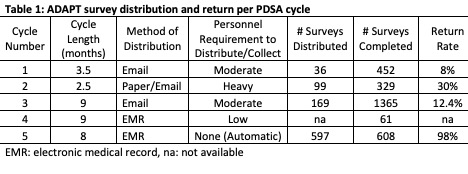Session Information
Session Type: Poster Session A
Session Time: 6:00PM-7:00PM
Background/Purpose: The challenges of transitioning patients with chronic rheumatic diseases from pediatric to adult care can lead to increased morbidity and mortality following transfer. Therefore, approaches to assess transition readiness are urgently needed, and should ideally be practical and sustainable. The Adolescent Assessment of Preparation for Transition (ADAPT) is a validated survey of patient self-reported transition readiness. Our overall goal was to implement a low-labor strategy by which 90% of transition-eligible patients complete an ADAPT survey at each visit.
Methods: Transition-eligible patients are age 14 years or older and attending a return clinic appointment. We conducted Plan-Do-Study-Act (PDSA) cycles using different methods of ADAPT survey distribution to eligible patients. Numbers of surveys distributed and rates of surveys returned during each PDSA cycle were calculated and compared.
Results: Our initial PDSA cycle distributed ADAPT surveys through a Research Electronic Data Capture (REDCap) database using email, requiring moderate weekly personnel effort yet achieving only 8% survey return rate (Table 1). In cycle 2, in-person coordinators increased the return rate to 30%. In March 2020, pandemic-related clinic closures and transition to telehealth necessitated a return to survey distribution by email (cycle 3). However, we observed an increase in survey return rate from cycle 1 by more than half (12.4%) despite using the same delivery method and have attributed this finding to increased patient/family familiarity with electronic clinic communications. The launch of telehealth inspired efforts to coordinate survey distribution using the electronic medical record (EMR). In cycle 4, providers could manually assign surveys to eligible patients while in the EMR. Results for returned surveys were obtained by monthly data pull, but did not capture the denominator of eligible patients. In cycle 5, the EMR was adjusted so that surveys are automatically launched to eligible patients prior to both in-person and telehealth appointments for completion via electronic clinic check-in. This method requires no personnel effort. Results are provided by monthly data pull and yielded 597/608 (98%) returned surveys in the first 8 months.
Conclusion: Using quality improvement cycles, we have created a fully automated method for assessment of patient self-reported transition readiness. Distribution through the EMR prior to appointments is efficient and effective. In the future, the ADAPT data we generate will allow us to assess for correlations between patient self-reported transition readiness and successful healthcare transition.
To cite this abstract in AMA style:
McDonald D, Nasto K, Fergason K, Robichaux M, Danna B, Maher M, Alexander A, Coleman A, Dykes A, Rogers J, Gillispie-Taylor M, Vogel T. Quality Improvement Cycles to Actualize Distribution of the Adolescent Assessment of Preparation for Transition (ADAPT) Survey [abstract]. Arthritis Rheumatol. 2023; 75 (suppl 4). https://acrabstracts.org/abstract/quality-improvement-cycles-to-actualize-distribution-of-the-adolescent-assessment-of-preparation-for-transition-adapt-survey/. Accessed .« Back to 2023 Pediatric Rheumatology Symposium
ACR Meeting Abstracts - https://acrabstracts.org/abstract/quality-improvement-cycles-to-actualize-distribution-of-the-adolescent-assessment-of-preparation-for-transition-adapt-survey/

